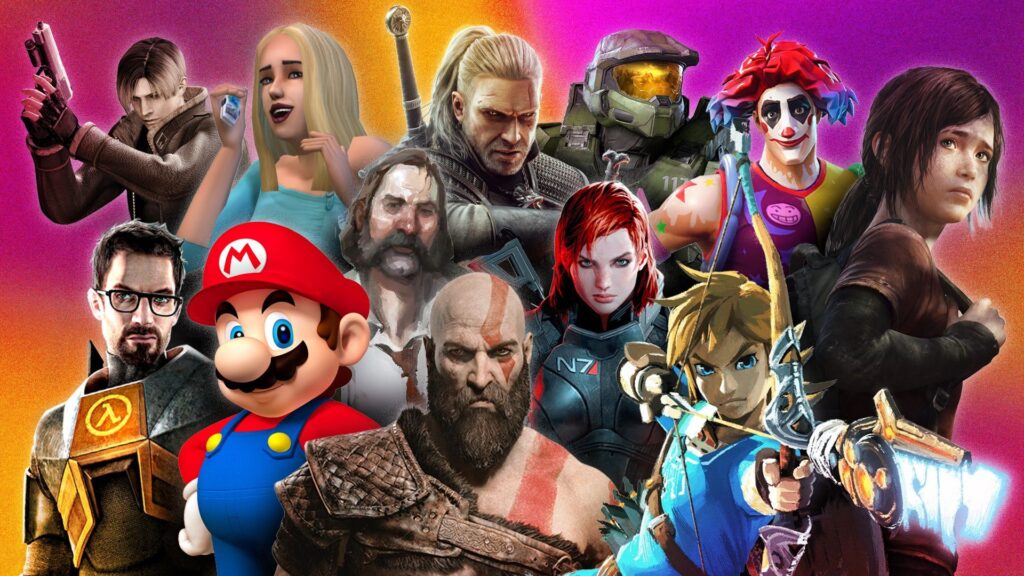The world of gaming has grown significantly in recent years, from humble beginnings to an entertainment powerhouse enjoyed by millions around the globe. Today, video games span a wide array of genres, platforms, and experiences, from casual mobile games to immersive virtual reality worlds. This article takes you on a journey through the evolution of games, from their early days to the cutting-edge innovations shaping the future of the gaming industry.
1. The Evolution of Video Games
Video games began as simple pixelated experiences in arcades during the late 20th century. As technology advanced, so too did the complexity and scope of games. From 2D side-scrollers like Super Mario Bros. to 3D adventures in The Legend of Zelda, the gaming industry began to capture the imagination of players worldwide.
The Rise of Home Consoles
In the 1980s and 1990s, home consoles like the Nintendo Entertainment System (NES), Sega Genesis, and PlayStation revolutionized how people interacted with games. These systems brought iconic franchises like Super Mario, Sonic the Hedgehog, and Final Fantasy to living rooms, allowing gamers to enjoy high-quality experiences without leaving their homes.
The Advent of Online Gaming
The early 2000s marked a pivotal shift as the internet began to play a larger role in gaming. Online multiplayer games, such as World of Warcraft, Halo, and Counter-Strike, connected gamers across the globe, creating vast online communities and laying the groundwork for the massive esports scene that would follow.
Mobile Gaming and Casual Games
As smartphones became ubiquitous, mobile gaming took center stage. Games like Angry Birds, Candy Crush, and Pokémon Go attracted millions of casual players, expanding the audience for gaming beyond traditional hardcore gamers.
2. Popular Game Genres
Games come in a variety of genres, each offering a unique experience. Some genres have stood the test of time, while others have emerged in recent years to capture the interest of gamers.
Action and Adventure Games
Action games like Grand Theft Auto V and Assassin’s Creed combine fast-paced gameplay with storytelling. These games often feature expansive open-world environments, giving players the freedom to explore while completing missions and uncovering hidden secrets.
Examples:
- The Legend of Zelda: Breath of the Wild
- Spider-Man (PS4)
- Red Dead Redemption 2
Role-Playing Games (RPGs)
RPGs immerse players in rich, detailed worlds, often featuring character progression, decision-making, and exploration. The Witcher 3: Wild Hunt, Skyrim, and Persona 5 are examples of games that transport players to fantastical worlds filled with unique characters, quests, and narratives.
Examples:
- The Elder Scrolls V: Skyrim
- Final Fantasy VII Remake
- Cyberpunk 2077
Strategy Games
Strategy games challenge players to think critically and plan their moves ahead. Whether in turn-based games like Civilization VI or real-time strategy (RTS) games like Starcraft, these games require a strategic approach to outsmart opponents.
Examples:
- Age of Empires IV
- Command & Conquer
- XCOM 2
Multiplayer Online Battle Arena (MOBA) Games
MOBA games such as League of Legends and Dota 2 have become staples in competitive gaming. These team-based games focus on real-time tactics and collaboration, often leading to thrilling esports tournaments watched by millions.
Examples:
- League of Legends
- Dota 2
- Smite
Battle Royale Games
Battle royale games like Fortnite and PlayerUnknown’s Battlegrounds (PUBG) bring players together in large maps where only one can emerge victorious. The last-player-standing gameplay, combined with fast-paced action and ever-shrinking safe zones, has captivated millions of players worldwide.
Examples:
- Fortnite
- Apex Legends
- Call of Duty: Warzone
3. Gaming Technology and Innovation
The gaming industry is constantly evolving, with new technologies pushing the boundaries of what’s possible. From improved graphics to virtual reality (VR) and augmented reality (AR), the gaming experience is becoming more immersive than ever before.
Virtual Reality (VR)
Virtual reality games allow players to step into fully immersive, 3D worlds. Using VR headsets like the Oculus Rift or PlayStation VR, players can experience games in a completely new way, whether they’re fighting zombies or exploring distant planets.
Examples:
- Beat Saber
- Half-Life: Alyx
- The Walking Dead: Saints & Sinners
Augmented Reality (AR)
AR games blend digital elements with the real world. Popularized by Pokémon Go, AR gaming overlays game elements on real-world environments, encouraging players to get outside and explore their surroundings.
Examples:
- Pokémon Go
- Harry Potter: Wizards Unite
- Ingress
Cloud Gaming
Cloud gaming allows players to stream games directly from the cloud, eliminating the need for expensive hardware. Services like Google Stadia, NVIDIA GeForce Now, and Xbox Cloud Gaming enable players to enjoy high-quality games on low-end devices, with all the heavy processing done on remote servers.
4. Esports and Competitive Gaming
Esports has become a global phenomenon, with professional players competing in games like League of Legends, Counter-Strike: Global Offensive, and Overwatch for large cash prizes and international recognition. Competitive gaming has reached a level of prominence comparable to traditional sports, with live-streaming platforms like Twitch and YouTube Gaming offering fans a chance to watch their favorite players and teams in action.
The Esports Scene
Tournaments and leagues have sprung up around popular games, with The International (Dota 2) and League of Legends World Championship being some of the most watched and lucrative events in gaming. Professional esports players are becoming household names, and teams are attracting sponsorships and endorsement deals from major brands.
5. The Future of Gaming
The gaming world is poised for even more exciting developments in the future. With advances in artificial intelligence (AI), machine learning, and more powerful hardware, the possibilities for gaming are virtually endless.
Next-Generation Consoles
The PlayStation 5 and Xbox Series X/S have ushered in the next generation of gaming consoles, offering faster load times, improved graphics, and new features like ray tracing. These advancements are enhancing the gaming experience, making games more realistic and immersive.
AI and Procedural Generation
As AI continues to improve, we’re likely to see more intelligent NPCs (non-playable characters) and dynamic, procedural game worlds that adapt based on player choices. Games will become more responsive, offering unique experiences every time you play.
Metaverse and Social Gaming
The idea of the metaverse—a persistent, shared virtual space where players can interact with each other and the environment in real-time—could soon become a reality. Games like Fortnite and Roblox are already building virtual worlds where social interaction and gaming are seamlessly blended.
Conclusion
The world of games is vast, dynamic, and constantly evolving. Whether you’re a casual player enjoying mobile games or a dedicated gamer immersed in VR or esports, gaming offers experiences for everyone. As technology continues to advance, the gaming industry will keep pushing the boundaries of what’s possible, making it one of the most exciting fields in entertainment.
With immersive experiences, competitive gaming, and groundbreaking technological innovations, the future of games is set to be more thrilling than ever before. So, grab your controller, headset, or mobile device, and get ready to embark on the next great adventure in the world of games.



